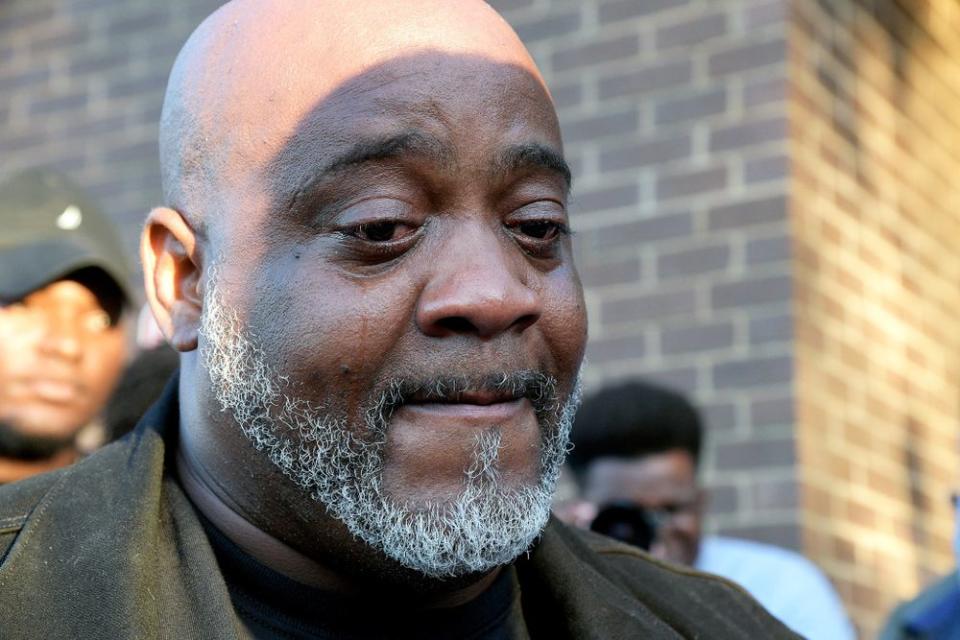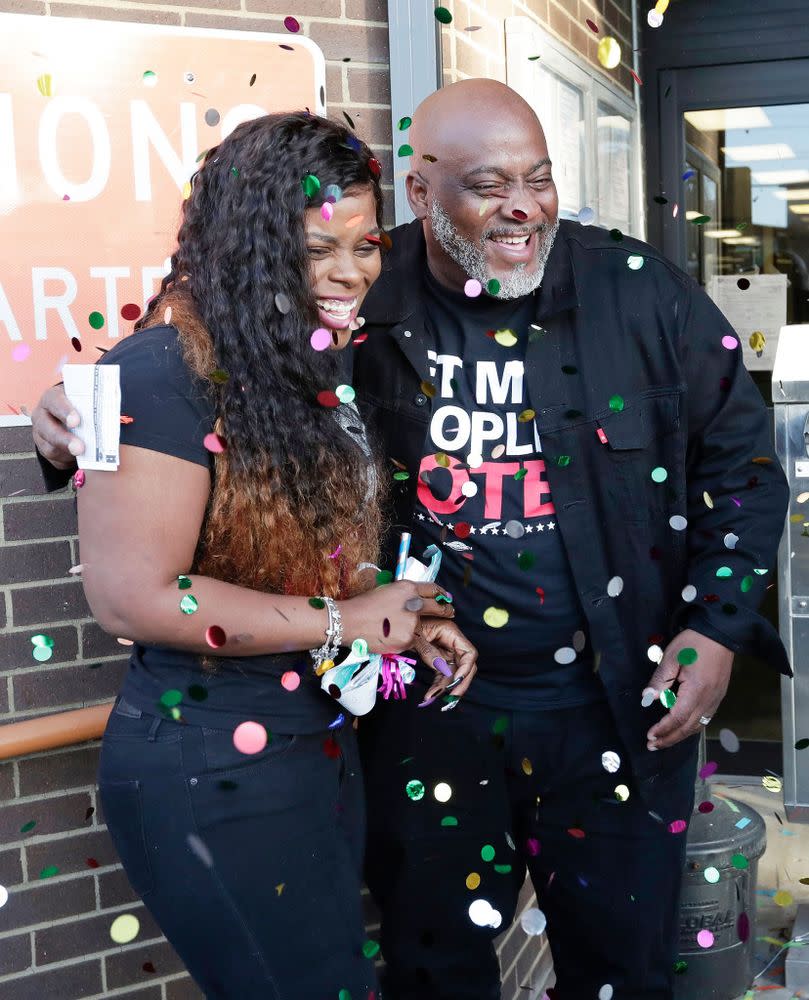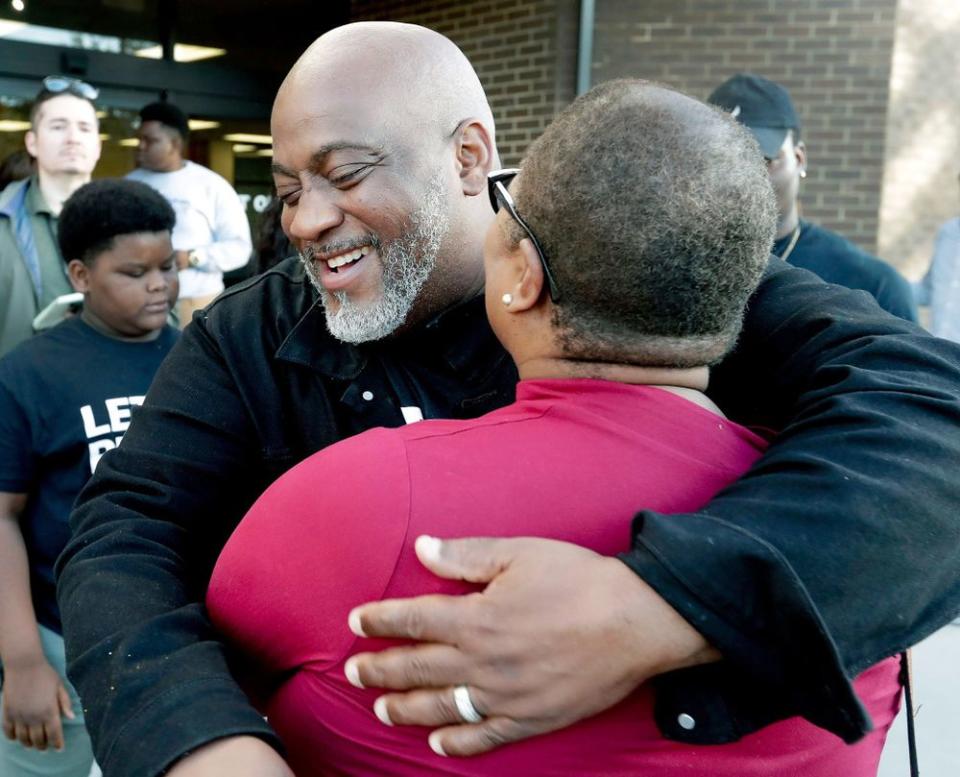From Homeless Addict to Law School Grad & Dad-of-5 — and How He Carried a Wave of Change Across Florida

For many Floridians, Jan. 8 was just another Tuesday, dawning bright and cool — but for Desmond Meade, that day brought a moment he had been anticipating for more than 14 years.
Meade, the president of the Florida Rights Restoration Coalition, was surrounded by his wife and some of their children as he registered to vote for the very first time.
The excitement and realization of what was about to happen started while he was in the car, driving with his son to the registration office. Meade says that, until then, he had never had the opportunity to take his family to go vote, to talk about civic responsibility and the value of one’s voice.
“Oh my God, this is going to be my opportunity,” Meade recalls thinking. “Now that I’ve registered, I could lead my family to the polling locations to vote.”
Until recently, Florida was in a minority of states that still barred felons from being able to vote even after their full sentences were completed, including probation, unless they received individual relief from the Executive Clemency Board.
Critics have argued such a measure is essentially racial discrimination laundered through the state, as it disproportionately targets non-white offenders. The restriction traces back to the post-Civil War period, according to the Orlando Sentinel.
Meade had been stripped of his voting rights following multiple felony convictions, but after completing his sentence he made the decision in August 2005 to transform his life — on the same day he tried to kill himself.
“I was actually standing in front of railroad tracks, waiting for the train to come,” he says. “I was homeless, I was addicted to drugs, unemployed and not too long released from prison. I didn’t have any idea of how I would see the light at the end of the tunnel. I didn’t have any hope, no self-esteem.”
“I was just there contemplating how much pain I was going to feel when the train ran over my body,” he continues.
But the train never arrived.
Meade lived.
RELATED: José Andrés Opens a Kitchen in D.C. to Feed Federal Workers During the Government Shutdown


Soon, he found himself crossing the railroad tracks and walking a couple of blocks until he reached an intake facility that helped connect him with a drug treatment program. Over four months, he was able to get clean and then found refuge in a homeless shelter.
But his transformation didn’t stop there.
“It created an eternal obligation that I had to be an asset to my community and to give back,” he says of his turnaround.
With that in mind, Meade enrolled at Miami-Dade College — while still at the homeless shelter — and graduated with the school’s highest honors after four years. He committed himself to his education and was accepted into the Florida International University College of Law. All the while, he was still living in poverty.
Even after all of that, Meade was not able to sit for the Florida Bar because of his felony convictions.
Meade’s journey to advocacy began in earnest during his time at Miami-Dade, having first started to volunteer at the homeless shelter — for gun violence reduction and to overturn felony disenfranchisement.
While in law school he joined the grassroots Florida Rights Restoration Coalition, which spearheaded Amendment 4, the measure which ultimately gave Meade and more than a million others with criminal records the right to vote. (Sex criminals and murderers are excluded.)
The amendment passed overwhelming in Florida in the November election.
Meade says it was the people he met who pushed him to keep working on behalf of the Florida Rights Restoration Coalition.
“As I started traveling the state of Florida, meeting people from all walks of life and hearing their stories, it was their stories that provided that fuel, that spark to say ‘Man, something has got to change.’ ” he says.

RELATED VIDEO: Voting is Sexy — Just Ask These Sexy Men!
In the early days as an activist, Meade found himself putting in more than 50,000 miles a year on his car, driving across the state to petition and speak to volunteers and authorities.
While he describes his work as personal — working for people with similar experiences to him — he says it was also about a bigger picture.
“We knew that a more inclusive democracy was a more viable democracy,” he says. “And a more viable democracy is good for everyone.”
His work also led him to his wife, Sheena Meade, who now heads strategic partnerships and initiatives at the FRRC.
“You know when they say, ‘When you know, you know?’ ” Meade says. He calls Sheena “God’s gift” to him.
They first met through her sister, in February 2012, and dated for just five months before Meade proposed in June. They tied the knot that same December and Meade became a stepfather to her five children: Xavier, 21, Xandre, 19, Nathan, 16, Xcellence, 14, and 11-year-old Xion.
Still, “I was so laser focused on the mission,” Meade says. That meant there wasn’t always all the time he needed to be a dad — sometimes missing football games and cheerleading competitions.
“At the end of the day, it’s not necessarily regret, just an understanding that there were sacrifices required,” he says.

Nov. 6 was when it all paid off: Amendment 4 was approved with more than 5.1 million votes, granting nearly 1.4 million Floridians the right to vote.
It went into effect on Jan. 8, and Meade was sure to be there that day to register. He was joined by one of his sons, who pre-registered, and his daughter, who was there to help him fill out the paperwork.
In that moment, Meade says, he realized he had the opportunity not only to teach his kids about their rights, but that they can speak out and make change.
“When we look at [the amendment passing], what we see is that those 5.1 million votes, they weren’t based on hate, they weren’t based on fear,” Meade says. “Those votes were based on love, forgiveness and redemption.”


